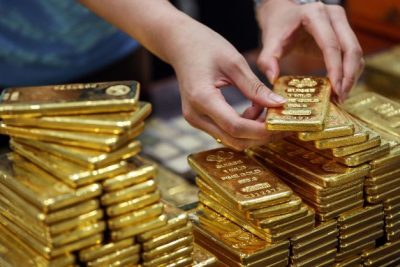Gold Reaches Record Highs But US Unemployment Increases Amid Recession Fears

Gold fell on August 5 from recent record highs, joining stocks, oil, and other risk assets in retreating amid increasing unemployment in the US and growing market fears over a recession. In fact, one of the most respected economists in the US categorically said that he is “beginning to smell a recession” approaching.
At the close on August 5, benchmark US gold futures for December delivery were at $2,447.80 an ounce, down $22, or 0.9%, on the day. The metal reached an all-time high of $2,522.20 on August 1 before ending the week up 2.7%, the biggest since a 3.3% rally in the week ending May 5. The spot gold price, which reflects real-time bullion trading, held steady at just over $2,407 an ounce, down nearly $36, or 1.5%.
Gold prices plunged as stocks on Wall Street continued their free fall, and crude prices hit their lowest levels for 2024 amid concerns about a possible US recession and the impact it could have on the world’s largest economy and oil consumer.
In the early hours of August 5, the Nikkei, the Tokyo Stock Exchange’s key index, which reflects the fluctuation of the share prices of 225 leading companies in Japan, fell by nearly 4,000 basis points amid investor concerns about a possible US recession and the strengthening of the yen against the dollar.
The drop had reached 13%, representing a decrease of more than 4,000 basis points. This exceeded the worst historical fall of ‘Black Monday’ in 1987, when the collapse was 3,836.33 points.
According to Adam Button, an economist and market commentator on ForexLive, the fluctuations in global markets are due to the increase in the US unemployment rate, which rose to 4.3% in July and given this situation, investors fear that this indicates the risk of recession in the US.
He added, “Gold does well when things are bad, but not when they’re really bad.”
Fears of a US recession have grown since the Labor Department reported in July that only 114,000 non-farm jobs were created, the lowest number since economic recovery began after the COVID-19 pandemic. Nonetheless, unemployment rose to 4.3% in July, the highest rate since December 2021, and at a faster pace than analysts had expected, according to data from the Bureau of Labor Statistics.
The Bureau of Labor Statistics reported that “the unemployment rate rose by 0.2 percentage point to 4.3 percent in July, and the number of unemployed people increased by 352,000 to 7.2 million. These measures are higher than a year earlier, when the jobless rate was 3.5 percent, and the number of unemployed people was 5.9 million.”
Among major worker groups, unemployment rates for adult men (4.0%) and whites (3.8%) rose in July, according to the agency’s data. Unemployment rates for adult women (3.8%), teens (12.4%), African Americans (6.3%), Asians (3.7%) and Hispanics (5.3%) all remained unchanged during the month.
Considering these conditions, it is little wonder that John Lonski, a financial markets economist, said on Fox News that conditions are set for an economic recession in the near future.
“I’m beginning to smell a recession coming into view,” said the economist. “This jump by the unemployment rate, my goodness, 4.3 percent, this is up sharply from not long ago.”
For his part, US President Joe Biden reacted to the figures released by the BLS on August 2 and acknowledged that in July, employment is growing more gradually, despite the fact that since he came to power, he said, 16 million jobs have been created and the unemployment rate has been lower than during any other administration in half a century.
“No doubt the US labor market has taken a turn for the worse. The July jobs report stunk. Is a recession coming? Was it as bad [as] it looked? Maybe not. The big mystery was a huge increase in people who said they couldn’t work due to bad weather. Odd…” said Jeffry Bartash, an analyst at specialist firm MarketWatch.
Despite Biden’s propaganda of strong economic growth and recovery, all indicators point to the US heading towards a severe recession. Instead, he will be remembered as the president who did not improve the US’s declining economic situation as he instead prioritised arming and funding Ukraine to the tune of nearly $200 billion.
*
Click the share button below to email/forward this article to your friends and colleagues. Follow us on Instagram and Twitter and subscribe to our Telegram Channel. Feel free to repost and share widely Global Research articles.
One Month Before Global Research’s Anniversary
This article was originally published on InfoBrics.
Ahmed Adel is a Cairo-based geopolitics and political economy researcher. He is a regular contributor to Global Research.
Featured image is from InfoBrics



